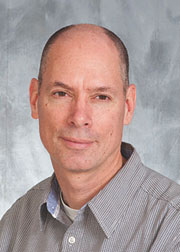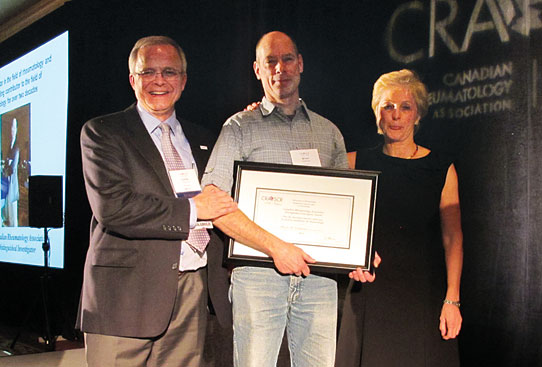Summer 2014 (Volume 24, Number 2)
The CRA’s 2014 Distinguished Investigator: Dr. Brian Feldman
Download PDF

1. What circumstances or which individuals propelled you towards investigative research? Did you anticipate your career trajectory leading in this direction?
I had been interested in clinical research, and what is now called “evidence-based medicine” since I was a high school student. My father is an academic pediatrician and was on faculty at McMaster University from the late 1960s until the mid-1980s. Our family friends were some of the leaders in the development of clinical epidemiology and, while I was a teenager, I was strongly influenced by my father and his colleagues and the exciting movement they were creating.
I sought out opportunities to participate in research—starting in high school—and took the opportunity (with the strong encouragement of my rheumatology mentors Dr. Ron Laxer and Dr. Earl Silverman) to do graduate work in the area during my fellowship. The University of Toronto was just starting their clinical epidemiology graduate program at the time, and it was a very exciting place to study. Dr. Elaine Wang, the late Dr. John-Paul Szalai, and Dr. Claire Bombardier were some of my fantastic graduate school mentors, amongst many others. I certainly did not expect to spend so much time doing science—and I did not expect my clinical practice to shrink to where it is now—but things evolved over the years (as they do) and I could not be happier.
2. You have developed investigational methods to study patients with rare disorders, which have been adopted in countless research studies. What has guided your design of clinical trials? How do you feel your contributions have altered the research landscape in Canada?
My methods have not been widely adopted; rather, I hope my work has allowed other researchers to feel comfortable looking for alternative research designs when studying therapies in difficult situations. As rheumatologists, we look after pat-ients with a wide variety of rare disorders. Classical clinical trials often require large numbers of subjects to produce precise and definitive results. Like many other frustrated investigators I felt—and I still feel—that finding new ways to study how well treatments really work is a worthwhile goal, even when adequate numbers of research patients are not available.
The goal is, I guess, to get the best possible evidence for treatments even if classical clinical trials are not feasible. If my work has had any influence, I hope it is by encouraging investigators to be more flexible in their thinking about producing evidence, and that some evidence is better than none.
3. Through your advocacy efforts, the Canadian pediatric rheumatology agenda has advanced considerably. What do you feel is the primary obstacle in the pediatric field? What do you foresee as future successes?
As Canadians we value children, and the health of children, very highly. However, there are far fewer sick children than, say, sick elderly folks. For example, while osteoarthritis (OA) may affect 40% or more of Canadian adults, childhood arthritis (depending on how we define it) affects only about 1 in 250 children. We love children, but Canadian funding for clinical care and research is, by necessity, directed towards the much larger health challenges. I believe our successes in the field of pediatrics have come through the foresight of some of our pediatric rheumatology leaders in developing very well organized collaborations across the country. This has allowed us to compete aggressively for research funding and develop stronger advocacy than we could have without banding together. And, there has been strong support for this in the rheumatology community in general—the CRA, The Arthritis Society (TAS), the Canadian Arthritis Network (CAN), the whole Arthritis Alliance of Canada (AAC)—these organizations have been very supportive of our efforts to improve care and research for children.
4. Your investigative approach is comprehensive, covering research into clinical manifestations, disease course and outcome, therapeutic approaches, and trial design. In what ways do you feel this inclusivity renders you a more effective researcher?
I suppose there are different ways one can develop a research career. Young researchers are often told that they need a laser-like focus in order to succeed. And there are certainly great examples of highly focused and very successful researchers. Looking back, I have done it a different way.
I had the opportunity to be able to chase down all the questions that seemed super interesting and use all the methods that seemed to have new potential as they presented themselves. This involves straying far away from rheumatology at times, for example, into blood disorders, cancer, short gut surgery, inflammatory bowel disease, and liver disorders. Probably the most common thing I hear when I meet with the graduate students and coordinators—either from me or from them—is “wouldn’t THAT be cool!” I am not sure our lack of focus makes us more effective, but it certainly makes the whole process a lot of fun!

Dr. Feldman receiving his award from CRA President Dr. Carter Thorne and Dr. Claire Bombardier.
5. How and why should rheumatologists engage to a greater degree with TAS?
I got involved with TAS initially as a way of “paying back”, as they funded my clinical fellowship. TAS is one of the largest funders of arthritis research in Canada, and has a potent advocacy voice representing our patients. It is also one of the main avenues through which the Canadian public interacts with the arthritis community. Over the years, I have heard many people sing the praises of TAS, but I have also heard of a few disgruntled rheumatologists complaining about the direction TAS had been taking. I think the main reason to get involved with an institution is that getting involved is how we influence the direction that institution is taking; this is certainly true for TAS.
6. You hold numerous chairs, so many in fact, I feel we should address you as the “head table”. How do you manage all of your achievements concurrently? Is there some advice you can offer to your colleagues on how to balance their commitments and obligations?
I am probably not the best person to talk about “balance”, but here goes: in order to get stuff done, I find it very important to continually challenge my priorities.
I keep a computer database of my projects and “to-dos”, and everything is in priority order. As a new task comes up I always think deeply about just how important it is, relatively. I schedule my week, usually on Sundays, so that I make time for the highest priority tasks, and so that at the end of the week I can look back and say, “I got some good stuff done this week”.
It is also important, I believe, to schedule time for personal development and learning, which to me usually means reading slightly outside of the field. Finally, I think even the busiest person should make time to have some fun. I have just taken up the sport of equestrian reining—it is a blast—and it is a great way, at least for me, to get my head out of rheumatology and research so that I am fresh when I get back to work.
7. For those wanting to pursue rheumatology and a career in research, what is your advice?
This is a great time to get into rheumatology. There is a marked shortage of personnel and there are positions open all over the country for all types of rheumatologists, including community clinicians, academic clinicians, educators, and researchers.
For those interested in research, I would suggest two things that will really “up the game”. First, do formal graduate studies, preferably a PhD, and with a great supervisor. Second, do that training at the end of your clinical training. It is pretty easy to jump back into clinical work after taking a few years off to do a PhD, as the pace of change in clinical medicine is slow—frustratingly so for many patients. It can be pretty daunting to jump back into research after taking a few years off to do a fellowship, as the pace of research is furiously fast, and it is hard to remain competitive after taking a break.
Brian Feldman, MD, MSc, FRCPC
Ho Family Chair in Autoimmune Diseases
Professor of Pediatrics,
Institution of Health Policy Management & Evaluation,
University of Toronto
Senior Scientist and Head,
Division of Rheumatology,
The Hospital for Sick Children
Toronto, Ontario
|



